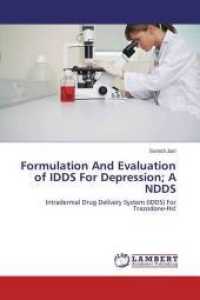- ホーム
- > 洋書
- > 英文書
- > History / World
Full Description
Genocide is not only a problem of mass death, but also of how, as a relatively new idea and law, it organizes and distorts thinking about civilian destruction. Taking the normative perspective of civilian immunity from military attack, A. Dirk Moses argues that the implicit hierarchy of international criminal law, atop which sits genocide as the 'crime of crimes', blinds us to other types of humanly caused civilian death, like bombing cities, and the 'collateral damage' of missile and drone strikes. Talk of genocide, then, can function ideologically to detract from systematic violence against civilians perpetrated by governments of all types. The Problems of Genocide contends that this violence is the consequence of 'permanent security' imperatives: the striving of states, and armed groups seeking to found states, to make themselves invulnerable to threats.
Contents
Introduction: The Problems of Genocide; Part I. The Language of Transgression: 1. The Language of Transgression, 1500s to 1890s; 2. The Language of Transgression, 1890s to 1930s; 3. Raphael Lemkin and the Protection of Small Nations; 4. The Many Types of Destruction; 5. Inventing Genocide in the 1940s; Part II. Permanent Security: 6. Permanent Security in History: Empire and Settler Colonialism; 7. The Nazi Empire as Illiberal Permanent Security; 8. Human Rights, Population 'Transfer', and the Foundation of the Postwar Order; 9. Imagining Nation-Security in South Asia and Palestine: Partition, Population Exchange, and Communal Hostages; Part III. The Language of Transgression, Permanent Security, and Holocaust Memory: 10. Lemkin, Arendt, Vietnam, and Liberal Permanent Security; 11. Genocide Studies and the Repression of the Political; 12. Holocaust Memory, Exemplary Victims, and Permanent Security Today.








